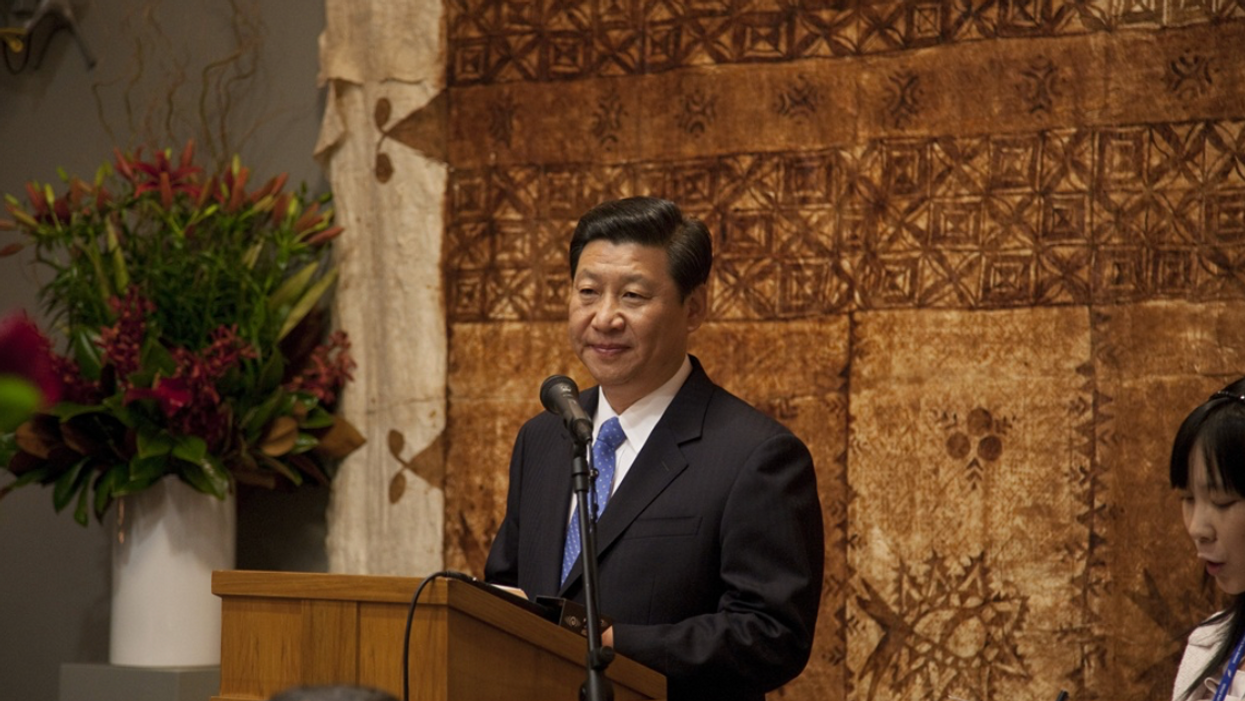Reprinted with permission from TomDispatch
Last month's insurrection at the Capitol revealed the dismal failure of the Capitol Police and the Department of Defense to use their expertise and resources to thwart a clear and present danger to our democracy. As the government reform group Public Citizen tweeted, "If you're spending $740,000,000,000 annually on 'defense' but fascists dressed for the renaissance fair can still storm the Capitol as they please, maybe it's time to rethink national security?"
At a time of acute concern about the health of our democracy, any such rethinking must, among other things, focus on strengthening the authority of civilians and civilian institutions over the military in an American world where almost the only subject the two parties in Congress can agree on is putting up ever more money for the Pentagon. This means so many in our political system need to wean themselves from the counterproductive habit of reflexively seeking out military or retired military voices to validate them on issues ranging from public health to border security that should be quite outside the military's purview.
It's certainly one of the stranger phenomena of our era: after 20 years of endless war in which trillions of dollars were spent and hundreds of thousands died on all sides without the U.S. military achieving anything approaching victory, the Pentagon continues to be funded at staggering levels, while funding to deal with the greatest threats to our safety and "national security" — from the pandemic to climate change to white supremacy — proves woefully inadequate. In good times and bad, the U.S. military and the "industrial complex" that surrounds it, which President Dwight D. Eisenhower first warned us about in 1961, continue to maintain a central role in Washington, even though they're remarkably irrelevant to the biggest challenges facing our democracy.
These days, it's completely normal for military and defense officials to weigh in endlessly on what once would have been civilian matters. As the Biden years begin, it's time to give some serious thought to how to demilitarize our democracy.
Unfortunately, in the America of 2021, the short-term benefit of relying on the widely accepted credibility of military figures to promote policies of every sort is obvious indeed. Who in the political class in the nation's capital wouldn't want a stamp of approval from dozens of generals, active or retired, endorsing their favorite initiative or candidate? (It's something in years past the authors of this piece have been guilty of as well.) As it happens, though, such approval comes at a high price, undermining as it does the authority of civilian officials and agencies, while skewing resources toward the Pentagon that should be invested elsewhere to keep us truly safe.
It's an essential attribute of the American system that the military remains under civilian authority. These days, however, given the number of current or retired military officers who have become key arbiters of what we should do on a dizzying array of critical issues, civilian control is the policy equivalent of an endangered species.
In the last election season, long before the attack on the Capitol, there was already an intense national discussion about how to prevent violence at the polls, a conversation that all too quickly (and disturbingly) focused on what role the military should play in the process. General Mark Milley, chairman of the Joint Chiefs of Staff, was repeatedly asked to provide assurances that it would have no role in determining the outcome of the election, something that in another America would have been a given.
Meanwhile, some actually sought more military involvement. For example, in a widely debated "open letter" to Milley, retired Army officers John Nagl and Paul Yingling stated that "if Donald Trump refuses to leave office at the expiration of his constitutional term, the United States military must remove him by force, and you must give that order." Proposals of this sort undermine the integrity of the many laws Congress and the states have put in place to prevent the military or armed vigilantes from playing any role in the electoral process.
Similarly, both former President Donald Trump and President Joe Biden have identified the military as a key future player in distributing the Covid-19 vaccine, something that could and should be handled by public-health institutions, if only they, like the Pentagon, had adequate resources.
The Military Knows Best?
During and after the attack on the Capitol, officials from the military and national security worlds were given pride of place in discussions about the future of our democracy. Their opinions were sought out by the media and others on a wide range of issues that fell well outside their primary areas of expertise. A letter from 10 former secretaries of defense calling on the Republican caucus to respect the results of the election was given headline attention, while political figures pressed to have retired military officers involved in the January 6th assault tried in military, not civilian, courts.
Before pursuing the second impeachment of Donald Trump, House Speaker Nancy Pelosi typically turned to the chairman of the Joint Chiefs (who isn't even in the civilian chain of command) to seek assurance that he could stop the president from starting a last-minute nuclear war. And none of this was faintly unusual, given that retired military officers have regularly been asked to weigh in on subjects as varied as abortion rights, climate change, and childhood obesity. It's not, of course, that such figures shouldn't be able, like anyone else, to offer their opinions or support on matters of public health and safety, but that their voices shouldn't matter more than those of public-health experts, scientists, medical professionals, or other civilians.
Despite its failure to win a war in decades, the military remains one of America's most respected institutions, getting the kind of appreciation that generally doesn't extend to other more successful public servants. After almost 20 years of forever wars, it's hard, at this point, to accept that the military's reputation for wisdom is deserved. In fact, continually relying on retired generals and other present or former national security officials as validators effectively erodes the credibility of, and the public's trust in, other institutions that are meant to keep us healthy and safe.
In the Covid-19 moment, it should be clear that relying on narrowly defined notions of national security harms our democracy, a subject that none of those military or former military figures are likely to deal with. In addition, in all too many cases, current and retired military officials have abused the public trust in ways that call into question their right to serve as judges of what's important, or even to imagine that they could provide objective advice. For one thing, a striking number of high-ranking officers on leaving the military pass through the infamous revolving door of the military-industrial complex into positions as executives, lobbyists, board members, or consultants for the defense industry. They work on behalf of firms like Raytheon, Lockheed Martin, Boeing, and General Dynamics that receive a combined $100 billion annually in Pentagon contracts with little accountability, even as they remain key go-to media figures.
They then use their former rank and the prestige attached to it to lobby Congress and influence the media on the need for endless wars and an ever-increasing military budget to support major weapons programs like Lockheed Martin's troubled F-35 Joint Strike Fighter — all without bothering to disclose that they stand to gain financially from the positions they're taking. And the prospect of a big, fat salary in the weapons sector upon retirement also exerts an unhealthy influence on officers still serving in the military who are often loath to anger, or in any way alienate, their potential future employers.
This revolving-door phenomenon is widespread. A study by the Project on Government Oversight found that, in 2018 alone, there were 645 cases in which the top 20 defense contractors hired former government officials, military officers, members of Congress, and senior congressional legislative staff as lobbyists, board members, or executives. This should hardly inspire public trust in their opinions
.In some cases, ex-military officers have even taken to the airwaves and the op-ed pages of newspapers to advocate for war without disclosing their ties to the arms industry. A 2008 New York Timesinvestigation, for example, revealed that a number of retired-officers-turned-media pundits with continuing defense industry ties had, for years, advocated for the Iraq War at the Pentagon's behest. Ex-generals like former Trump administration Defense Secretary James Mattis, who served on the board of General Dynamics before taking the helm of the Pentagon and returned there shortly after stepping down, too often use their stature to refrain from providing basic information to the media while befogging the transparency and accountability that should be a pillar of democracy.
The Politicization Of The Military
When civilian voices and policies are eclipsed as the central determinants in how our democracy should operate, a larger dilemma arises: continuing to rely on the military as a primary source of judgment for what's right or wrong in the civilian world risks politicizing the armed forces, too. From retired Lieutenant General Michael Flynn leading chants of "Lock her up!" at the 2016 Republican National Convention to the competition between Hillary Clinton and Donald Trump as well as, in the 2020 election campaign, between Joe Biden and Donald Trump to see who could get more retired generals to endorse him or her only helps militarize the civilian election process and politicizes what should be a nonpartisan institution.
Given the more than a trillion dollars Americans annually invest in the national security state, it's striking to note, for instance, how such institutions let us down when it came to addressing the threats of white nationalism. Last summer, the Interceptuncovered a buried FBI report on the shortcomings of various federal agencies when it came to dealing with domestic terrorism. Before the 2020 election, the bureau refused to release that report on the domestic threat of white supremacy. Last year, in a similar fashion, the Department of Homeland Security (DHS) withheld for monthsits assessment of the same "lethal" threat of racist extremism in this country.
While there must be a full investigation of what happened at the Capitol on January 6th, reports seem to indicate a striking blindness in the national security state to the possibility of such an attack. It's not that the DHS, the FBI, or the military need an influx of new funds to face the problem. Rather, what's needed at this moment in history is a clearer focus on the real risks to our country, which have little to do with foreign terrorists, the Taliban, or other such groups the U.S. has been fighting abroad for years on end. The Department of Defense typically did itself and the rest of us no favors by burying a report on widespread racism in the ranks of the military, which, though completed in 2017, didn't see the light of day until this January. Only in the aftermath of the riot at the Capitol did that organization finally begin to truly address its own white-supremacy problems.
The military, like so many other American institutions, has failed to reckon seriously with deep-seated racism in its ranks. Even before the January 6th insurrection, it was clear that such racism made it nearly impossible for Black officers to be promoted. And while many questioned the naming of key military bases after Confederate generals, the issue has only recently been addressed (over a presidential veto at that) with the creation of a new commission to rename them. Reports of active duty, reserve, and veteran members of the military aiding the Capitol insurrection only bring into stark relief the inexcusable costs of not having addressed the problem earlier.
Pentagon Spending Won't Make Us Safer
There are also high costs to be paid for relying on the Department of Defense to handle problems that have nothing to do with its primary mission. Using the armed forces as key players in addressing crises that aren't military in nature only further undermines civilian institutions and is often counterproductive as well.
In the initial stages of the Covid-19 pandemic, a number of politicians called for President Trump to use the Defense Production Act (as it seems Biden will indeed soon do) and the Department of Defense to ramp up the production of N95 masks, ventilators, and other personal protective equipment. The story of what happened to such funds in the Trump years should be telling. The Washington Post discovered that $1 billion in supposed pandemic relief money was instead funneled directly to defense contractors and $70 million of the funds the Pentagon spent went to ventilators that proved unfit for Covid-19 patients. While some of that money did go to bolster mask supply chains, another Post investigation discovered that such efforts did not come close to addressing national shortfalls and amounted to less than the department spends on instruments, uniforms, and travel for military bands.
Perhaps the most disturbing cost of our overreliance on the military can be found in Congress's budget and policy priorities. In December of last year, a bill to authorize nearly $740 billion in Pentagon spending garnered enough votes to easily overcome President Trump's veto (motivated mainly by his refusal to condone renaming military bases named after Confederate generals) at the very moment when Congress was blocking legislation to give $2,000 relief checks directly to Covid-19 embattled Americans.
By now, two decades into the twenty-first century, it's clear that more money for the Pentagon hasn't made this country safer. It has, however, helped give the military an ever more central role in our previously civilian political world. Biden's selection of retired General Lloyd Austin III to be secretary of defense only emphasizes this point. While it's certainly laudatory to appoint the first Black leader to that position, Austin has retired so recently that he needed a congressional waiver from a law requiring a seven-year cooling off period before taking up such a civilian post (just as Mattis did four years ago) — another sign that civilian control of the military is continuing to weaken. In addition, now that he has retired from his role in private industry, Austin stands to make a small fortune, up to $1.7 million, when he divests his stock holdings in Raytheon Technologies.
"In the councils of government, we must guard against the acquisition of unwarranted influence, whether sought or unsought, by the military-industrial complex," President Eisenhower warned Americans in his 1961 farewell address. How right he proved to be! Sixty years later, it's become all too clear that more must be done to deal with that very "unwarranted influence." The immediate crises of the American republic should be clear enough right now: responding to the pandemic and restoring our civilian democracy. Certainly, military leaders like Milley should be appreciated for agreeing on the need to prioritize the pandemic and oppose sedition. However, more Pentagon spending and more military influence will not, in the end, make us any safer.
Follow TomDispatch on Twitter and join us on Facebook. Check out the newest Dispatch Books, John Feffer's new dystopian novel Frostlands(the second in the Splinterlands series), Beverly Gologorsky's novel Every Body Has a Story, and Tom Engelhardt's A Nation Unmade by War, as well as Alfred McCoy's In the Shadows of the American Century: The Rise and Decline of U.S. Global Power and John Dower's The Violent American Century: War and Terror Since World War II.




